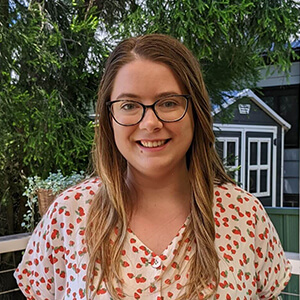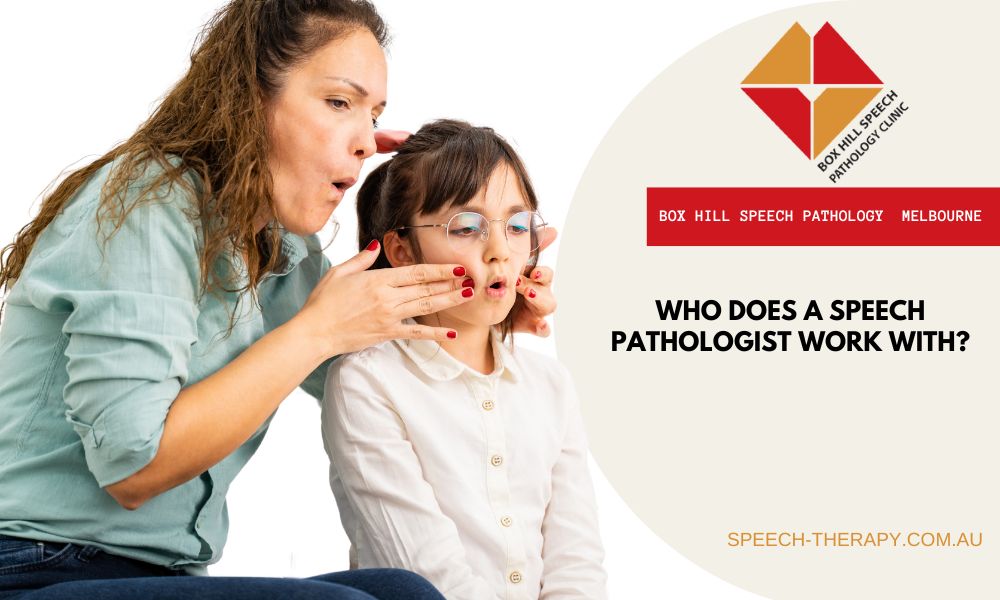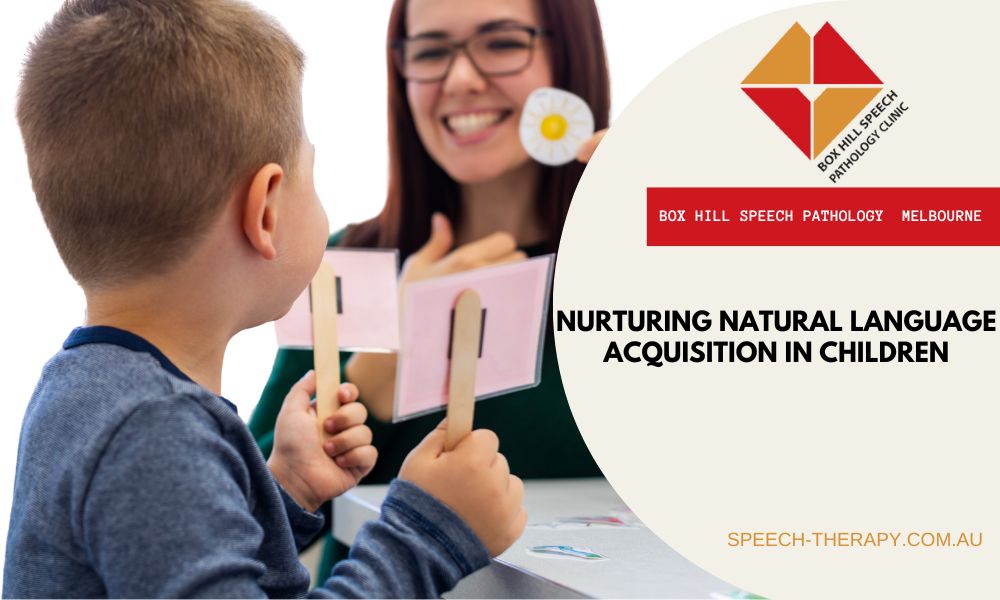Speech pathologists work to improve peoples’ communication or swallowing skills. But difficulties with communication or eating and drinking can affect many areas of life. That means we work best with a whole team of people… Read More
Meet our newest team members
Exciting News! Box Hill Speech Pathology welcomes three talented Speech Pathologists to our team starting February 15th.
Their expertise ensures prompt and exceptional services, eliminating waiting lists for children and individuals facing communication or feeding difficulties. Meet our expanded team, dedicated to your well-being!
Janice Chen
Brooke Urquhart
Katrina Haddon
Read our new 3 part information series on “stuttering”.
Part 1: What is Stuttering?
Let’s talk about the different types of stuttering, how it comes about, triggering factors and the importance of early intervention.
At Box Hill Speech Pathology, we help treat lots of people, young and old, who stutter. We understand that no two cases of stuttering are the same, so therefore treatment must also be personalised. Stuttering can present at different times in a person’s life and the onset can be sudden or developed slowly over time. Because stuttering can sound and look different for different people, its impact can also vary. Research has shown that early intervention provides the most effective results, so where possible, we recommend that children begin stuttering treatment as early as possible and ideally, before they commence school.
But first it’s important to understand what stuttering is. Stuttering is a communication disorder that interrupts the flow of speech. Everyone’s stuttering is different. It can have the same features or a mix of different types. Stuttering can sound like repeated sounds. Ye-Ye-Yesterday. Words: Yesterday, Yesterday, Yesterday. Syllables: Yes-Yes-Yesterday or phrases: Yesterday I went, Yesterday I went, Yesterday I went. Stuttering can also sound like the stretching of sounds: w-w-w-when, it can also feel like the words are getting stuck, (silence) Apple, Some other features that can also happen when you stutter are unplanned eye movements and facial movements,
Stuttering can vary across the day or across weeks, or it may naturally recover over time. However, it is important to be mindful of the following things. If a person has been stuttering for a significant period of time, if there is family history of stuttering, if the person has a coexisting communication difficulty such as a speech disorder or a language disorder, or if the person begins to withdraw from social situations. In these cases, the need to seek advice from a speech pathologist becomes more urgent. We are pleased to share that we offer a range of treatment options for both children and adults. A qualified speech pathologist will be able to co-design the best treatment plan for you or your child. The first step in accessing quality, evidence based treatment, is to call the clinic today and book in your teletherapy appointment or your in person face to face clinic consultation.
Part 2: Stuttering Treatment Options for Children
Let’s discuss the different types of stuttering treatment available, the importance of tailoring the right program to your child and what results you can expect upon completion.

Let’s discuss some of the therapy approaches that are available for preschool and school-aged children. After a comprehensive assessment with your speech pathologist is complete. A decision about the treatment approach can be made. Because of varying individual needs, a therapy plan will be developed that is individualised to your child. It is important to note that a therapy plan that is helpful for one child may not be as effective for another.
The aim of these programs is to achieve no stuttering or almost no stuttering. Treatment will teach children how to improve their overall speech fluency and support their participation in school and social activities.
For children, Box Hill Speech Pathology offers the following evidence based programs.
The Lidcombe program: this program is typically used for children under the age of six. It is a behavioral treatment program that focuses on providing positive reinforcement for smooth speech.
Syllable time speech: this program is typically used for children over the age of six, and can also be known as the Westmead program. It involves saying a syllable in time with the rhythmic beat.
The Oakville program: This program combines strategies from the two programs just mentioned, which include syllable time speech alongside positive reinforcement.
All programs mentioned here can be offered by telehealth or in clinic visits by our range of clinicians. So contact our clinic today.
Part 3: Stuttering Treatment Options for Adults & Adolescents
Let’s look at the different treatment options for adults & adolescents and how they’re designed to improve both stuttering and speech fluency in general.

In this article, we discuss what treatment may look like for adults or adolescents. It is important to note that treatment is different for children and for adults. For this population, the aim of treatment is to improve overall fluency. Adults who have been stuttering for an extended period of time may need strategies to manage and control their stuttering in their daily activities. The best evidence based programs are commonly referred to as speech restructuring programs. These strategies help us to speak in a way that improves overall fluency and minimizes stuttering.
The main treatment program that we deliver is called The Camperdown program. This program is recommended for adults and adolescents over the age of 12. It uses smooth speech strategies to teach individuals how to control their stuttering and in turn, aims to reduce stuttering frequency and severity. Whilst The Camperdown Program is the most widely used, there may be other evidence based programs, more suitable for your needs. This may include Self-Imposed Timeout or Syllable Time Speech. The most suitable program for you will be determined by your speech pathologist, following assessment and described to you in further detail.
All treatment options are proven to reduce stuttering and improve both social and emotional wellbeing. Adolescents and adults who stutter may experience anxiety relating to their communication, which in turn may impact on job performance and participation in social activities. While speech pathologists will support a person in reducing their stuttering and improving their overall fluency, some individuals may benefit from seeking advice from another health professional, such as a psychologist. All the therapy options mentioned in this video can be delivered by a range of our clinicians, both in the clinic and via telehealth. For more information, please contact the clinic today.
Committed to speech pathology. Committed to you.
For over 25 years we’ve understood that the needs of our clients come first.
You can feel confident that our experience can help you to overcome or manage speech impediments and other difficulties. Our friendly team of professional speech therapists provide assessment and evidence-based treatment to people of all ages, from toddlers to teenagers and adults. We know that taking the first step to treat a speech-related issue can be daunting, but you can relax – we’re here to help.
Professionals in language disorders & speech problems.
We can help you or your child to overcome such issues as:
- Stuttering
- Clarity
- Auditory processing
- Illiteracy
- Co-existing difficulties (physical disabilities or syndromes)
- Speaking English as a second language
- Being clearly understood
- Social skills
- Voice problems
Experience matters.
As one of Melbourne’s most trusted and longest-running speech pathology clinics, we are committed to helping you.
We tackle the tricky tasks that some other speech therapists may avoid, such as Tongue Thrust therapy. Our principal therapist, Vincent Borg, is one of the few male speech pathologists in Melbourne, which is often helpful for our male clients who find seeing a male specialist less stressful or embarrassing.
Our team all have their own speech and language special interest areas, so whatever your language concerns may be, there is someone here to help you. We have excellent facilities and resources, including modern interactive technology such as iPads and computer programs, to engage our clients and empower them to take charge of their own learning and practise.
Our fee structure is very straightforward, with no hidden costs or product affiliations. We are also a registered service provider, so you may be eligible for some Medicare rebates. Our reception staff are happy to advise you on the rebates that are available. Read more about our range of funding options.
We know you want to get started as soon as possible, but unfortunately now the demand is so high that we have a waiting list. The good news is that we have four new speech pathologists starting early next year so this will reduce the waiting time significantly. In the meantime, we offer teletherapy services and the wait time for these services is usually much shorter.
Speak out with clarity and confidence. Make an appointment with Box Hill Speech Pathology Clinic today.
As children approach school age, a common question that we get asked is, ‘Is my child ready to start school?’. The answer to this question… Read More
Some of the most exciting moments of parenting are when you witness your child’s language develop. Most of us have heard of typical language development,… Read More








